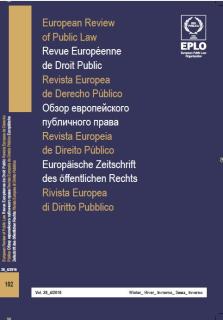
Les institutions supérieures de contrôle des finances publiques
des états membres de l’union européenne:
une indépendance institutionnelle garantie?
Doctorant en droit public, Université Paris I Panthéon-Sorbonne,
Membre de Observatory on Local Autonomy (OLA - France)
Every Member State of the European Union has a Supreme Audit Institution (SAI), in whatever form (Court of Audit, Audit Office...), the independence of which represents a major challenge for the credibility of the work carried out and the proper functioning of a rule-of-law State. At a strictly institutional level, this independence is evaluated by two criteria formalised by the international instances of association and of representation of the SAIs, that are on the one hand the legal safeguards (constitutional, legislative...) that surround it and ensure it, and on the other hand the budgetary autonomy that these texts grant to it (elaboration and execution). The examination of the mechanisms implemented by each of the Member States confirms that the SAIs display, with the nuances specific to each administrative culture, the required characteristics in order for them to be considered independent in terms of international standards.
Chaque Etat membre de l’Union européenne dispose d’une Institution supérieure de contrôle des finances publiques (ISC), quelle qu’en soit la forme (Cour des comptes, Bureau d’audit…), dont l’indépendance représente un enjeu cardinal pour la crédibilité des travaux effectués et le bon fonctionnement d’un Etat de droit. Sur un plan strictement institutionnel, cette indépendance s’apprécie à l’aune de deux critères formalisés par les instances internationales d’association et de représentation des ISC, qui sont d’une part les garanties juridiques (constitutionnelles, législatives…) qui l’entourent et la consacrent, et, d’autre part, l’autonomie budgétaire que ces mêmes textes lui accordent (élaboration et exécution). L’examen des dispositifs mis en place par chacun des Etats membres atteste que les ISC présentent, avec les nuances propres à chaque culture administrative, les caractéristiques requises pour être considérées comme indépendantes au regard des standards internationaux.





















